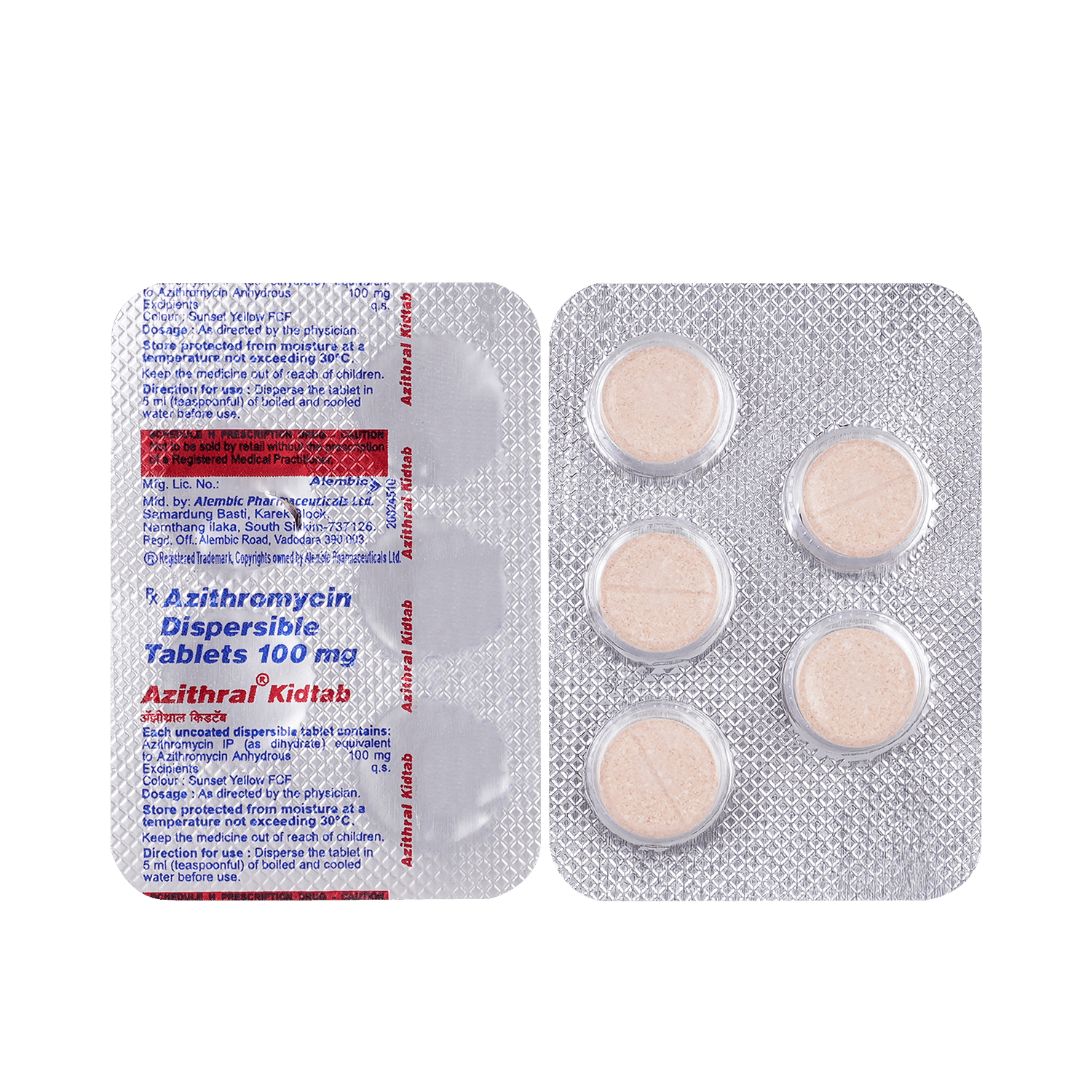
Aziral Kid 100mg Tablet
Manufacturer
Hiral Labs Ltd
Salt Composition
Azithromycin (100mg)
Key Information
Short Description
Aziral Kid 100mg Tablet is an antibiotic medication used to treat a wide range of bacterial infections in children.
Dosage Form
Tablet
Introduction
Aziral Kid 100mg Tablet is an antibiotic medication commonly given to children for the treatment of a wide range of bacterial infections targeting the ear, eyes, nose, throat, lungs, skin, and gastrointestinal tract. It is essential to complete the entire course of this medicine to avoid the bacteria multiplying again or causing another infection.
Directions for Use
Give Aziral Kid 100mg Tablet with food to avoid an upset stomach. Encourage your child to drink plenty of water in case diarrhea develops as a side effect.
How it works
Aziral Kid 100mg Tablet works by interfering with the synthesis of essential proteins required by bacteria to perform important functions, stopping the infection-causing bacteria from growing further and preventing the infection from spreading.
Quick Tips
Your child must complete the entire course of this medicine Give Aziral Kid 100mg Tablet with food to avoid an upset stomach Encourage your child to drink plenty of water in case diarrhea develops as a side effect Stop the medicine and contact the doctor immediately if your child develops an itchy rash, facial swelling, and breathing difficulties soon after the intake Only give Aziral Kid 100mg Tablet to your child for their current infection. Never save medicine for future illnesses
Related Medicines

Zady 100mg Tablet

Zithrox 100mg Tablet

Aziday Kid 100mg Tablet

Azila 100mg Tablet

Aziwis 100mg Tablet

Azinij 100mg Tablet

Azimak 100mg Tablet

Azitol 100mg Tablet

Azidol 100mg Tablet

Azithral KidTab
Frequently asked questions
What should I do if I accidentally take too much of Aziral Kid 100mg Tablet?
While Aziral Kid 100mg Tablet is unlikely to cause harm from an extra dose, it's essential to contact a doctor immediately. Overdosing may lead to unwanted side effects and potentially worsen your child’s condition.
Are there any severe side effects of Aziral Kid 100mg Tablet that I should be aware of?
Some possible serious side effects include persistent vomiting, kidney damage, allergy, diarrhea, and severe gastrointestinal infections. If your child experiences any of these symptoms while taking Aziral Kid 100mg Tablet, immediately consult a doctor.
Can I give my child other medications along with Aziral Kid 100mg Tablet?
It's crucial to inform your doctor about any other medicines your child is taking before starting Aziral Kid 100mg Tablet. Additionally, always consult a healthcare professional before giving your child any medication.
Can I get my child vaccinated while they are on treatment with Aziral Kid 100mg Tablet?
Antibiotics typically do not interfere with vaccines or cause a negative reaction. However, children should avoid getting vaccinated until their illness is fully resolved. Once your child feels better, the vaccine can be given.
What laboratory tests are recommended for long-term Aziral Kid 100mg Tablet use?
Periodically, your doctor may recommend getting kidney function tests and liver function tests to monitor your child's condition during long-term treatment with Aziral Kid 100mg Tablet.
Does Aziral Kid 100mg Tablet affect digestion in children?
Children often have sensitive stomachs and may experience digestive upset while taking medications. Antibiotics can negatively impact the good bacteria in their gastrointestinal tract, leading to increased risk of infection. Aziral Kid 100mg Tablet might kill off beneficial gut bacteria alongside bad bacteria, potentially leading to more infections. If your child experiences diarrhea while on Aziral Kid 100mg Tablet, do not stop the medication without consulting a doctor. Instead, call them for advice.
Why is Aziral Kid 100mg Tablet given for 3 days?
The duration of treatment depends on the type of infection being treated and your child's age. Aziral Kid 100mg Tablet might not always be given for 3 days. It is often prescribed as a single dose of 500 mg for 3 days or in specific cases of bacterial infections, such as genital ulcers, may be taken as a single 1 gram dose.
What things should I avoid when taking Aziral Kid 100mg Tablet?
It is generally recommended to avoid antacids while taking Aziral Kid 100mg Tablet. This can affect the effectiveness of the medication and it's also advisable to avoid sun exposure or tanning beds as Aziral Kid 100mg Tablet can increase your risk for sunburn.
Is Aziral Kid 100mg Tablet considered a strong antibiotic?
Aziral Kid 100mg Tablet is an effective antibiotic that's used to treat several bacterial infections. It has a longer half-life compared to other antibiotics, meaning it stays in the body longer and is usually taken once daily for a short duration. This makes it more potent than some other antibiotics.
Can I develop a yeast infection from taking Aziral Kid 100mg Tablet?
Some people may experience a fungal or yeast infection, known as thrush, after taking Aziral Kid 100mg Tablet. Antibiotics can sometimes disrupt the balance of good and bad bacteria in the gut, increasing the risk of a yeast infection. If you notice symptoms such as vaginal itching, discharge, white patches on your mouth or tongue, inform your doctor immediately.


